Charles E W Bean, Diaries, AWM38 3DRL 606/256/1 - 1915 - 1936 - Part 16
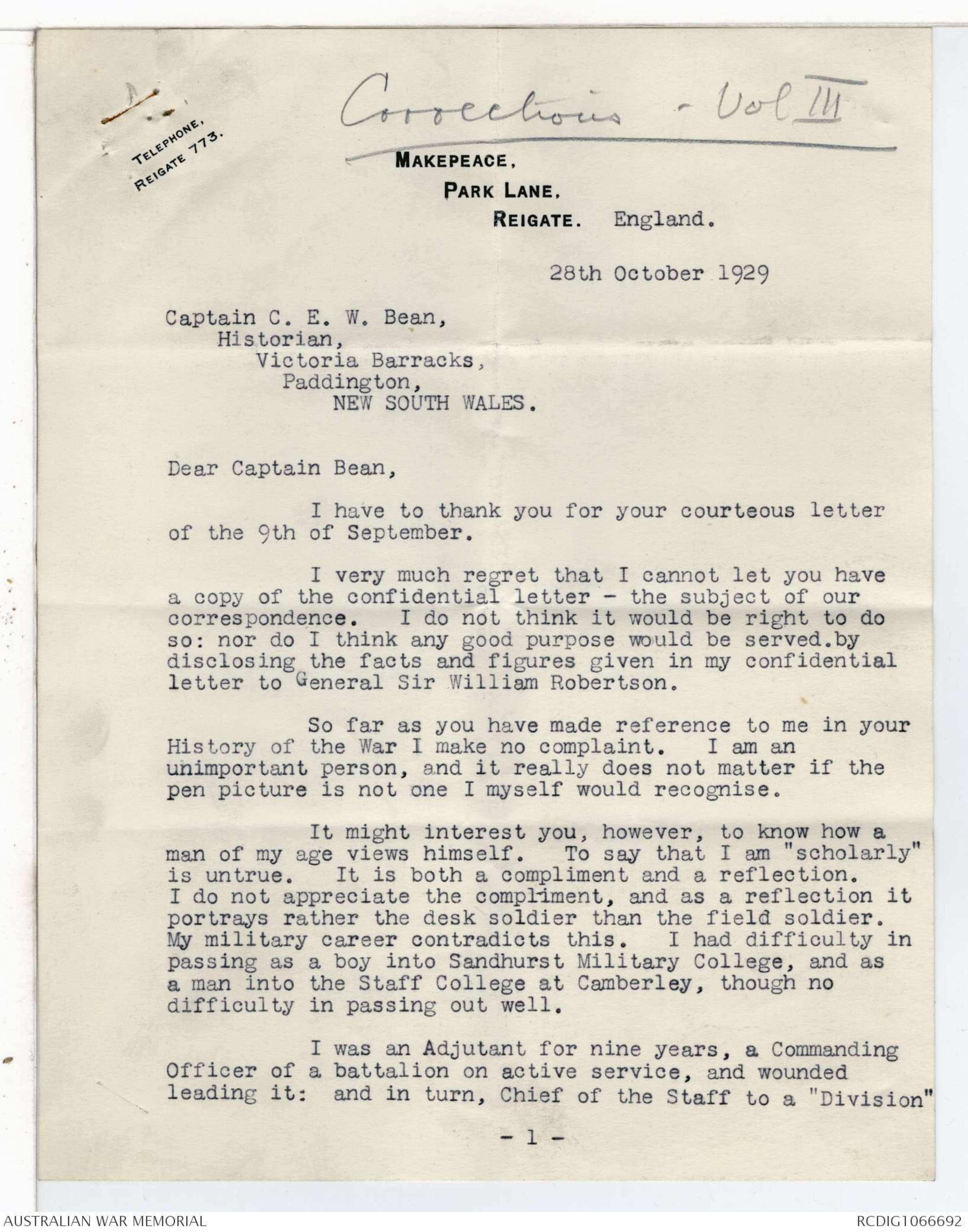
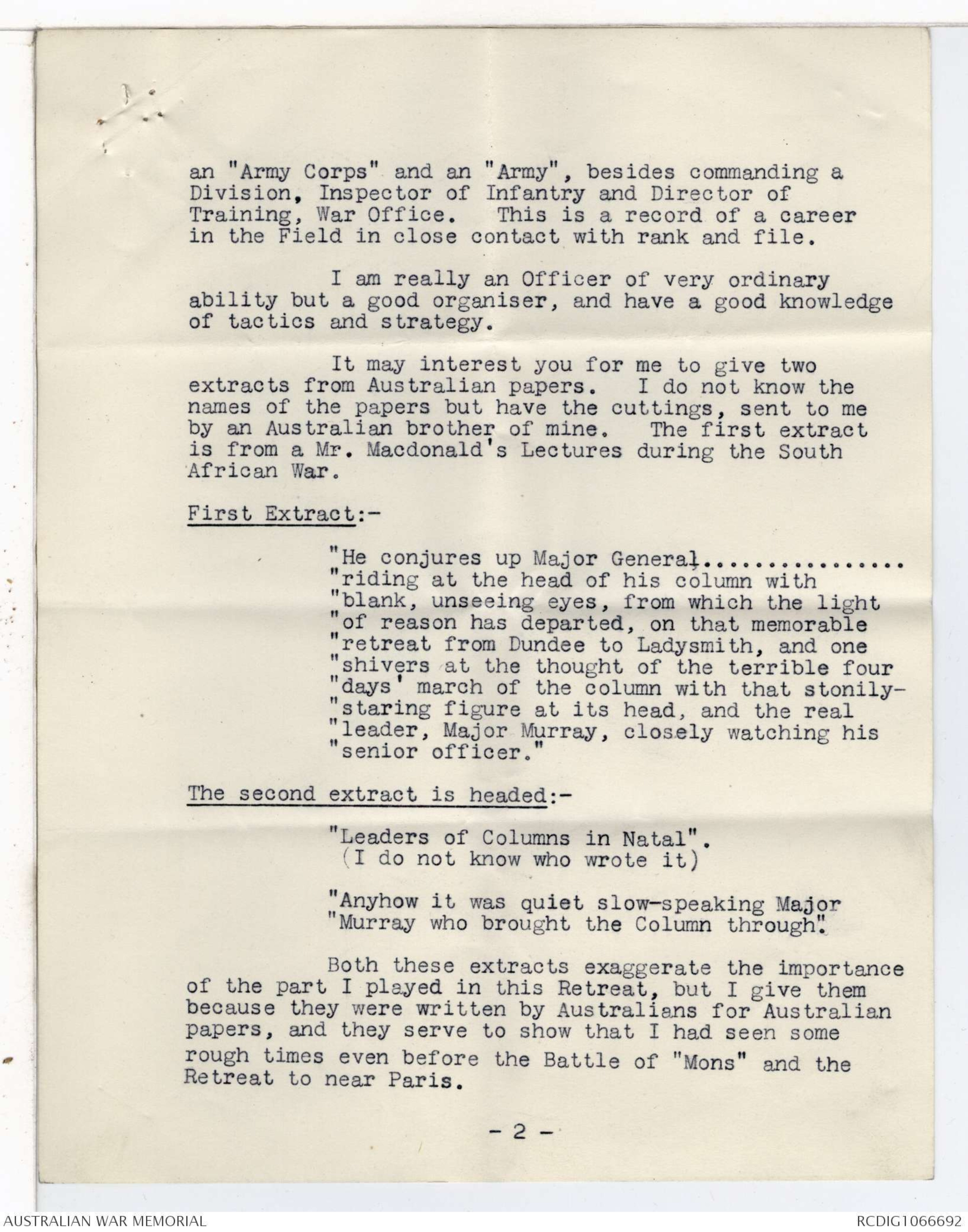
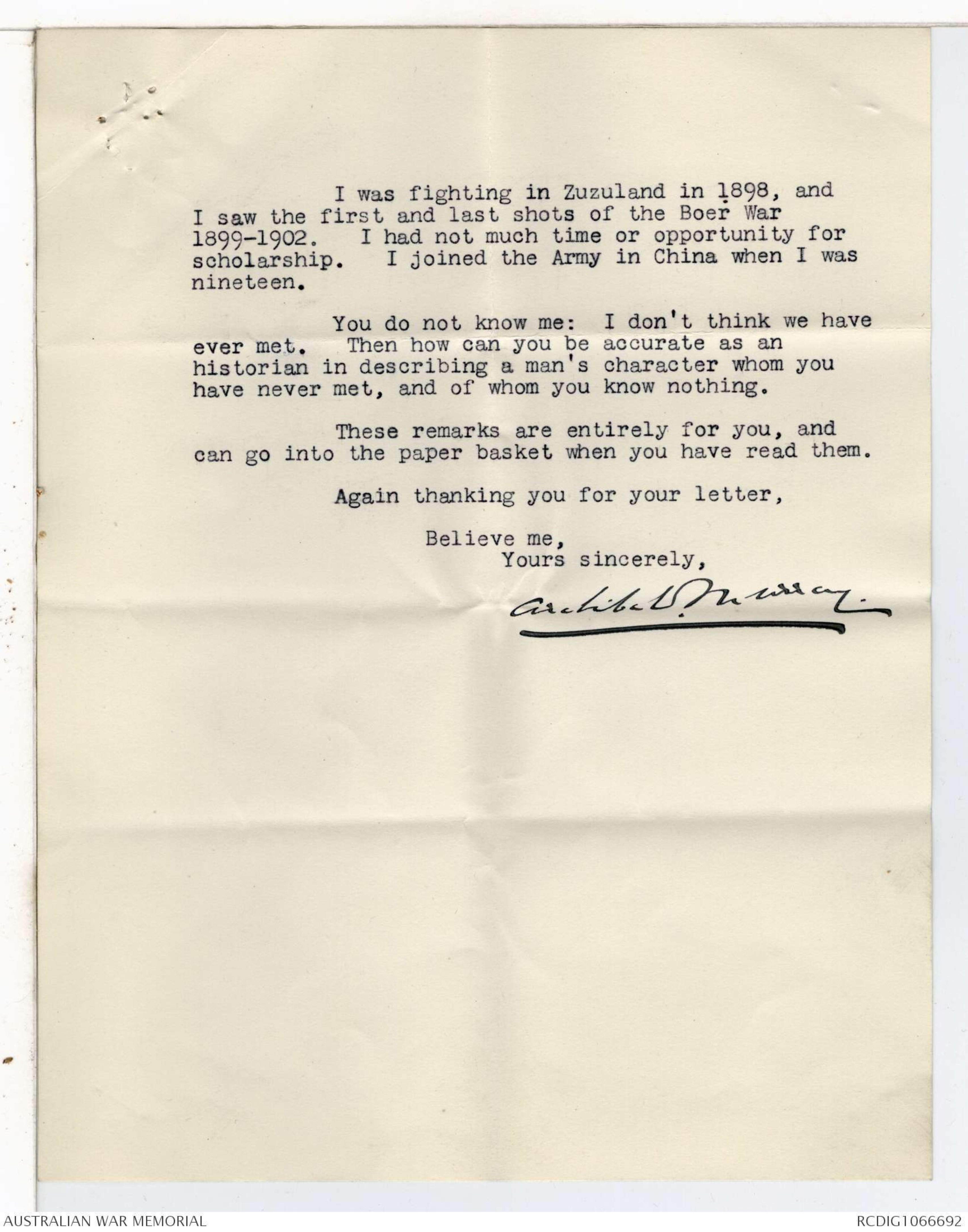
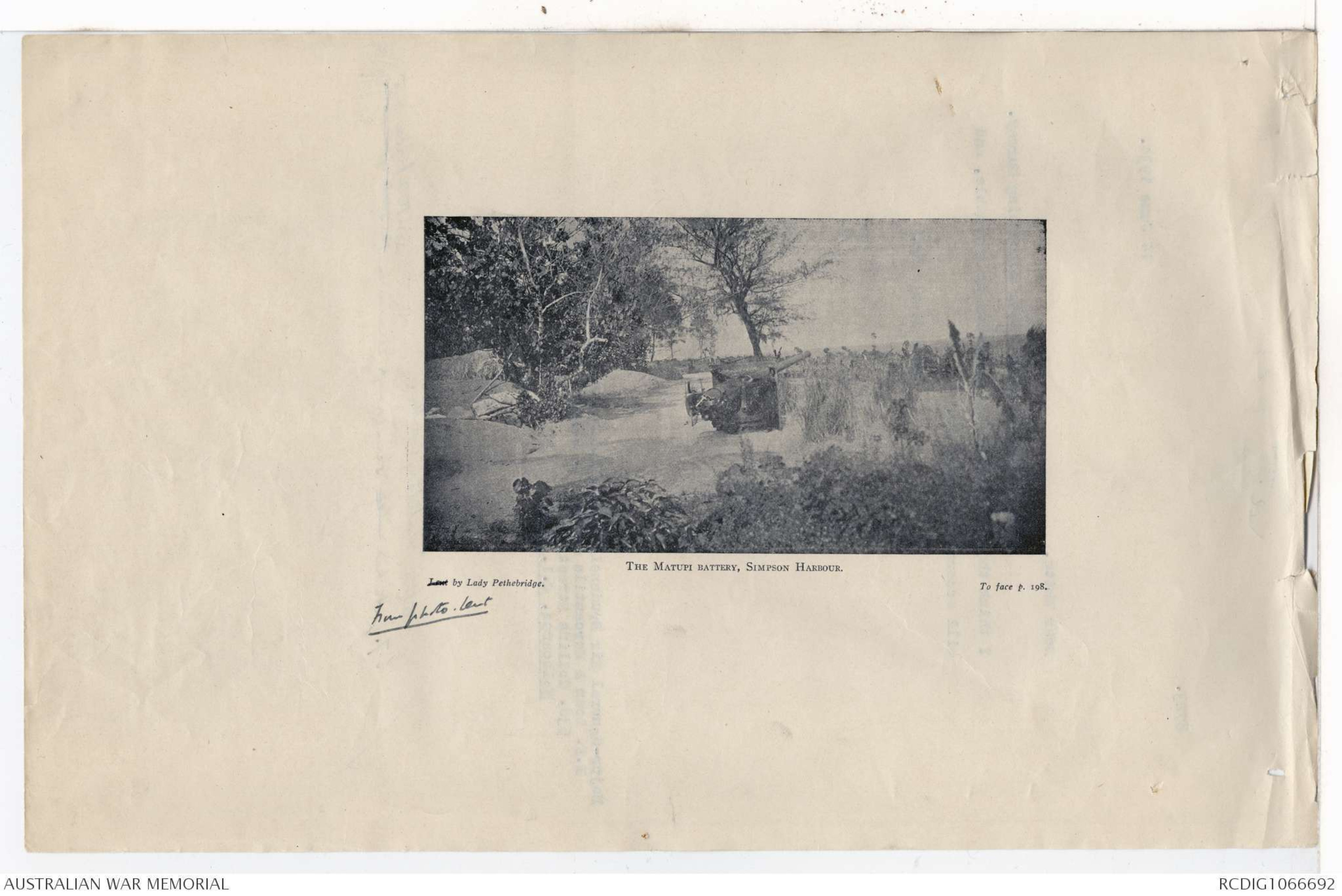
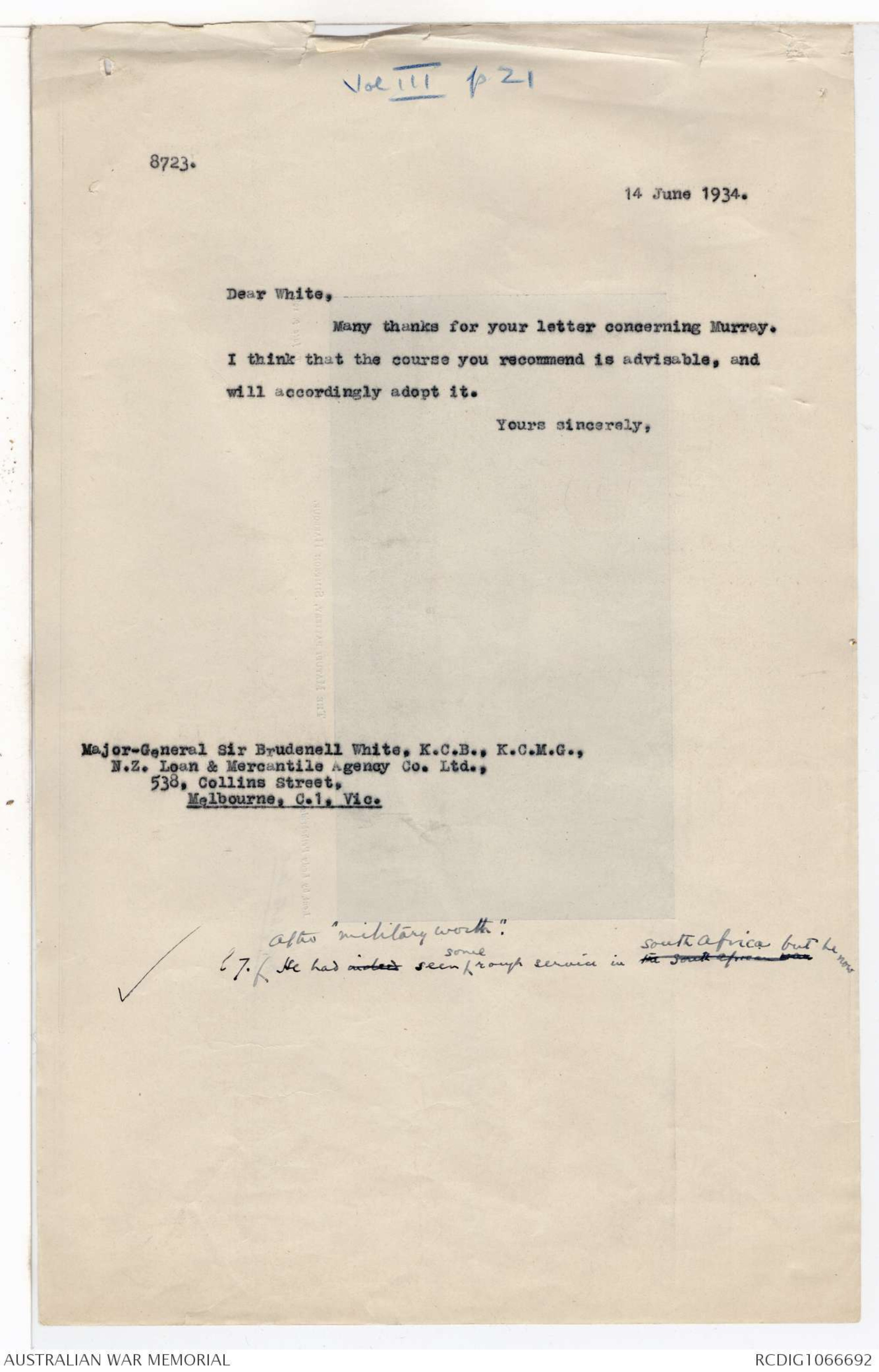
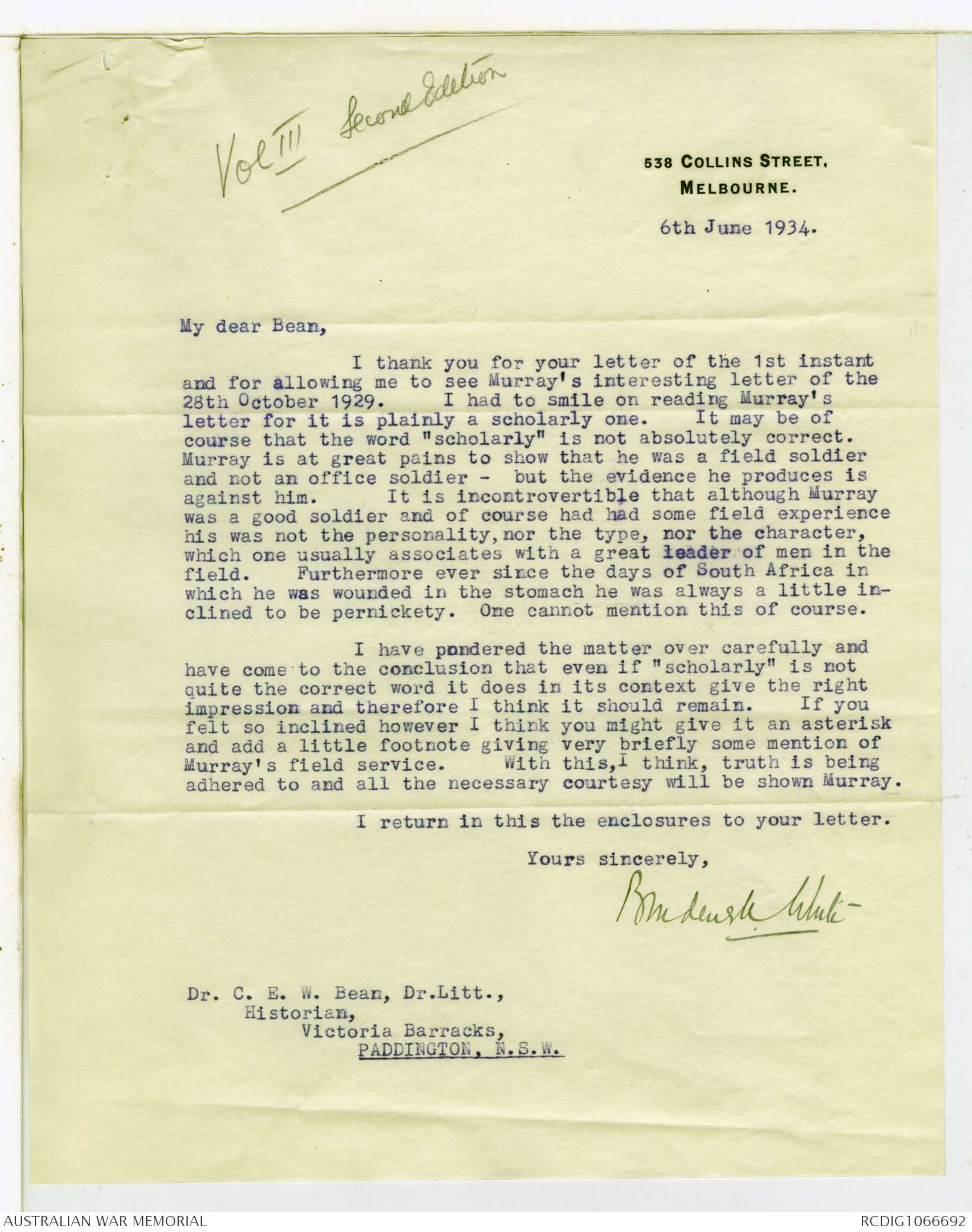
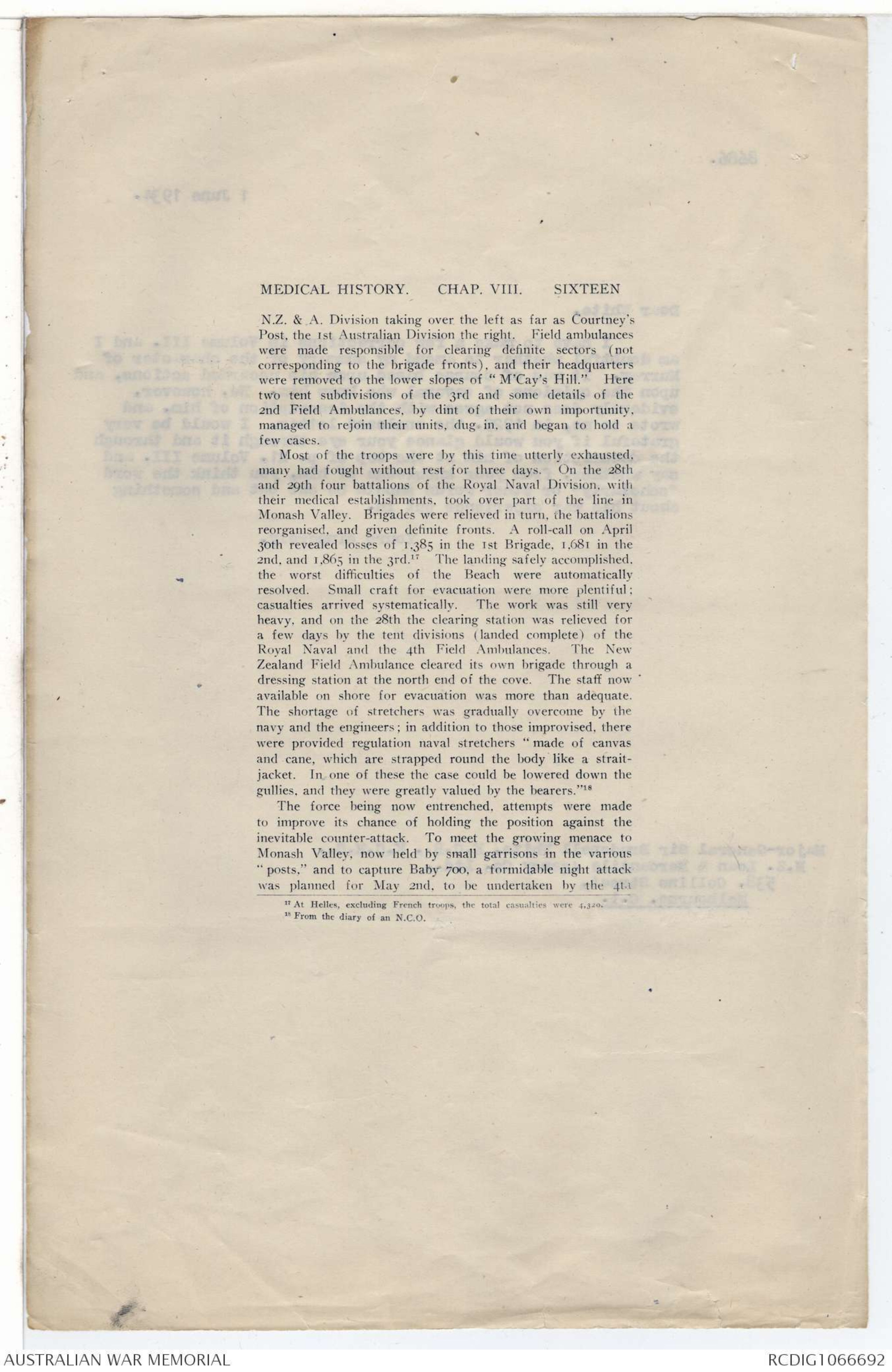
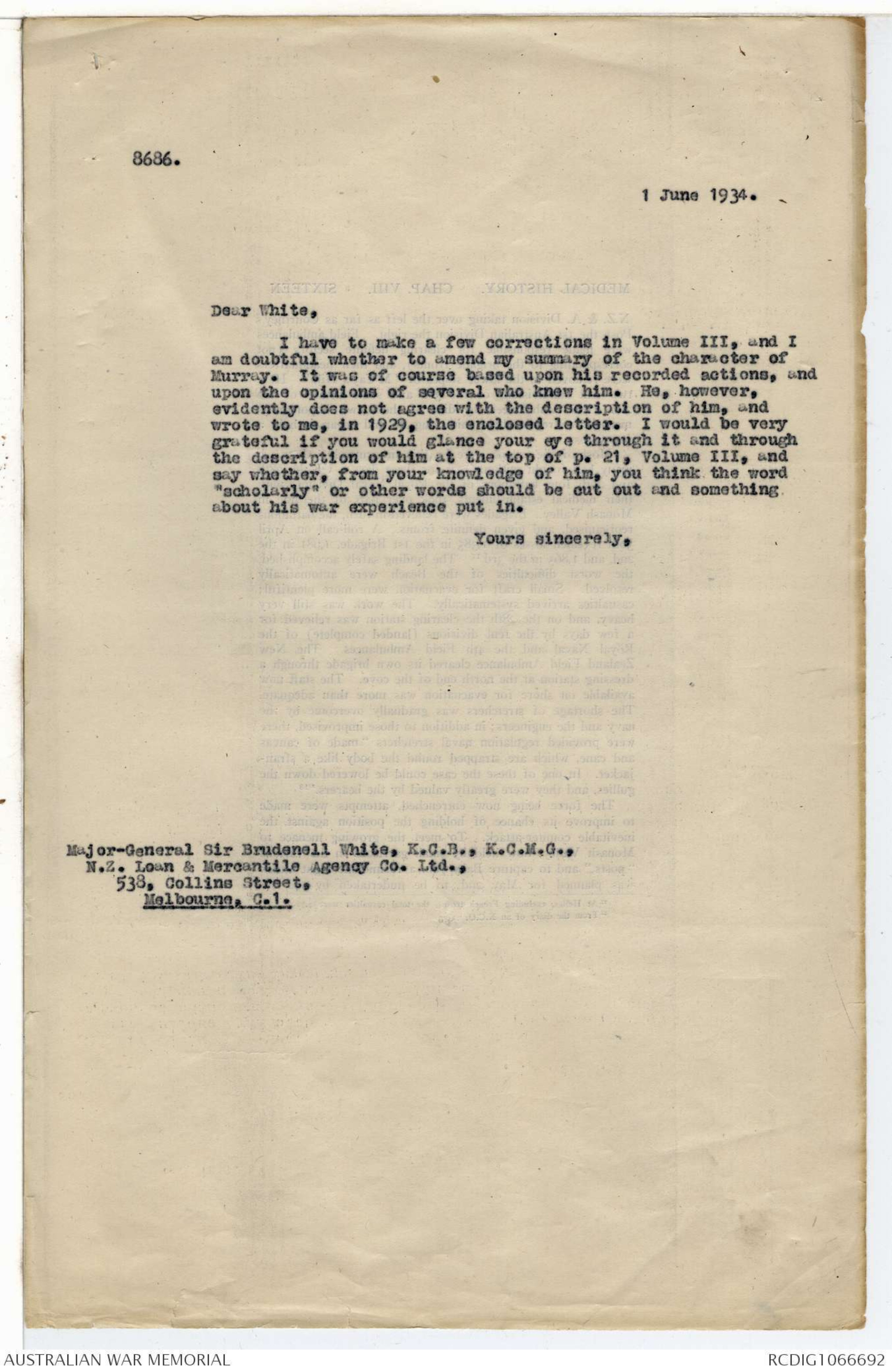
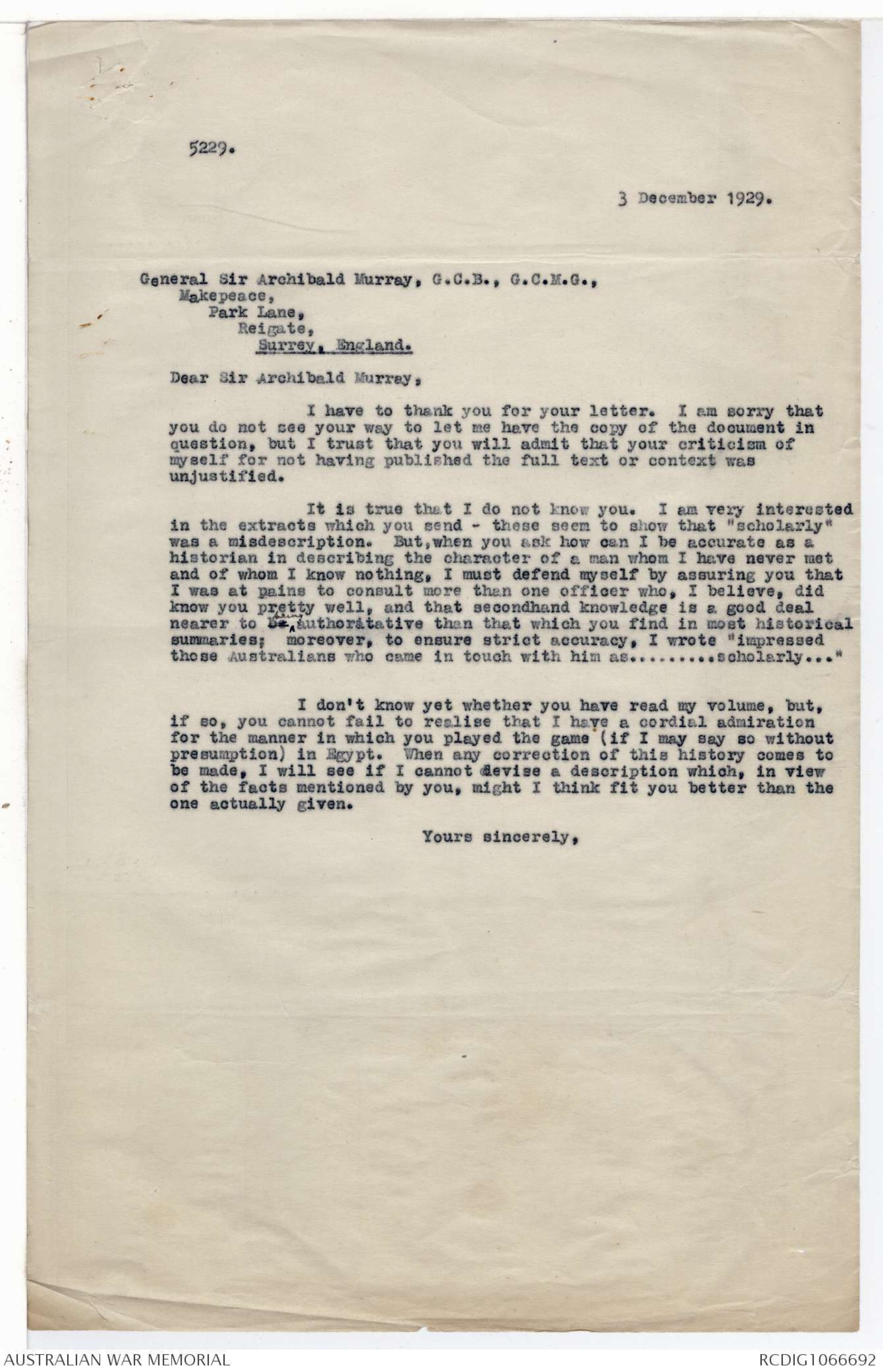
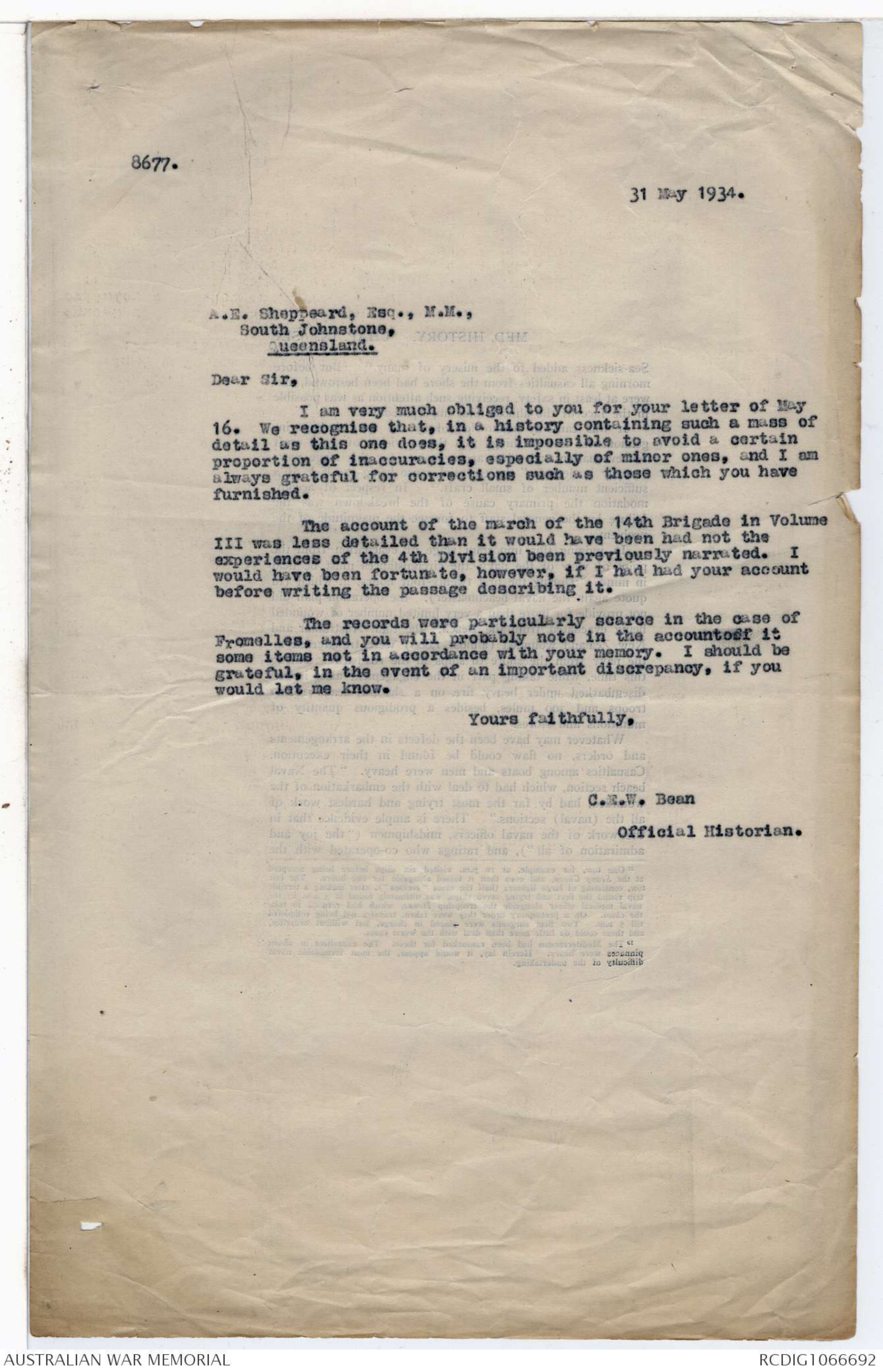
TELEPHONE Corrections. - Vol III
REIGATE 773
Captain C. E. W. Bean,
Historian,
Victoria Barracks,
Paddington,
NEW SOUTH WALES.
Dear Captain Bean,
I have to thank you for your courteous letter of the 9th of September.
I very much regret that I cannot let you have a copy of the confidential letter - the subject of our correspondence. I do not think it would be right to do so: nor do I think any good purpose would be served. by disclosing the facts and figures given in my confidential letter to General Sir William Robertson.
So far as you have made reference to me in your History of War I make no complaint. I am an unimportant person, and it really does not matter if the pen picture is not one I myself would recognise.
It might interest you, however, to know how a man of my age views himself. To say that I am "schorlarly" is untrue. It is both a compliment and a reflection. I do not appreciate the compliment, and as a reflection it portrays rather the desk soldier than the field soldier. My military career contradicts this. I had difficulty in passing as a boy into Sandhurst Military College, and as a man into the Staff College at Camberley, though no difficulty in passing out well.
I was an Adjutant for nine years, a Commanding Officer of a battalion on active service, and wounded leading it: and in turn, Chief of the Staff to a "Division"
an "Army Corps" and an "Army" , besides commanding a Division, Inspector of Infantry and Director of Training, War Office. This is a record of a career in the Field in close contact with rank and file.
I am really an Officer of very ordinary ability but a good organiser, and have a good knowledge of tactics and strategy.
It may interest you for me to give two extracts from Australian papers. I do not know the names of the papers but have the cuttings, sent to me by an Australian brother of mine. The first extracy is from a Mr. Macdonald's Lectures during the South African War.
First Extract:-
"He conjures up Major General................
"riding at the head of his column with
"blank, unseeing eyes, from which the light
"of reason has departed, on the memorable
"retreat from Dundee to Ladysmith, and one
"shivers at the thought of the terrible four
"days' march of the column with that stonily-
"staring figure at its head, and the real
"leader, Major Murray, closely watching his
"senior officer."
The second extract is headed:-
"Leaders of Columns in Natal".
(I do not know who wrote it)
"Anyhow it was quiet slow-speaking Major
"Murray who brought the Column through".
Both these extracts exaggerate the importance of the part I played in this Retreat, but I give them because they were written by Australians for Australian papers, and they serve to show that I had seen some rough times even before the Battle of "Mons" and the Retreat to near Paris.
I was fighting in Zuzuland in 1898, and. I saw the first and last shots of the Boer War 1899-1902. I had not much time or opportunity for
scholarship. I joined the Army in China when I was
nineteen.
You do not know me: I don't think we have
ever met. Then how can you be accurate as an
historian in describing a man's character who you
have never met, and of whom you know nothing.
These remarks are entirely for you, and
can go into the paper basket when you have read them.
Again thanking you for your letter,
Believe me,
Yours sincerely,
THE MATUPI BATTERY, SIMPSON HARBOUR
Vol III. p 21
8723.
14 June 1934.
Dear White,
Many thanks for your letter concerning Murray.
I think that the course you recommend is advisable, and
will accordingly adopt it.
Yours sincerely,
Major-General Sir Brudenell White, K.C.B., K.C.M.G.,
N.Z. Lean & Mercantile Agency Co. Ltd.,
538 Collins Street
MELBOURNE, C.1. Vic.
After "military worth".
He had mislead seen some rough services in /south Africa but he was
Vol III Second Edition
538 COLLINS STREET.
MELBOURNE.
6TH JUNE 1934.
My dear Bean,
I thank you for your letter of the 1st instant
and for allowing me to see Murray's interesting letter of the
28the October 1929. I had to smile on reading Murray's
letter for it is plaining a scholarly one. It may be of
course that the word "scholarly" is not absolutely correct.
Murray is at greats pains to show that he was a field soldier
and not an office soldier - but the evidence he produces is
against him. It is incontrovertible that although Murray
was a good soldier and of course had had some field experience
his was not the personality, nor the type, nor the character,
which one usually associates with a great leader of men in the
field. Furthermore ever since the days of South Africa in
which he was wounded in the stomach he was always a little in-
clined to be pernickety. One cannot mention this of course.
I have pondered the matter over carefully and
have come to the conclusion that even if "scholarly" is not
quite the correct word it does in its context give the right
impression and therefore I think it should remain. If you
felt so inclined however I think you might give it an asterisk
and add a little footnote giving very briefly some mention of
Murray's field service. With this, I think, truth is being
adhered to and all the necessary courtesy will be show Murray.
I return in this the enclosures to your letter.
Yours sincerely,
Dr. C. E. W. Bean, Dr.Litt.,
Historian,
Victoria Barracks,
PADDIINGTON. N.S.W.
MEDICAL HISTORY. CHAP. VIII. SIXTEEN
N.Z. & A. Division taking over the left as far as Courtney's
Post, the 1st Australian Division the right. Field ambulances
were made responsible for clearing definite sectors. (not
corresponding to the brigade front), and their headquarters
were removed to the lower slops of "M'Cay's Hill." Here
two tent subdivisions of the 3rd and some details of the
2nd Field Ambulances, by dint of their own importunity,
manages to rejoin their units, dug-in, and began to hold a
few cases.
Most of the troops were by t his time utterly exhausted,
many had fought without rest for three days. On the 28th
and 29th four battalions of the Royal Naval Division, with
their medical establishments, took over part of the line in
Monash Valley. Brigades were relieved in run, the battalions
reorganised, and given definite fronts. A roll-call onApril
30th revealed losses of 1,38 in the 1st Brigade, 1681 in the
2nd, and 1865 in the 3rd. (17). The landing safely accomplished
the worst difficulties of the Beach were automatically
resolved. Small craft for evacuation were more more plentiful:
casualties arrived systematically. The work was still very
heavy, and on the 28th the clearing station was relieved for
a few days by the tent divisions (landed complete) of the
Royal Naval and the 4th Field Ambulances. The New
Zealand Field Ambulance cleared its own brigade through a
dressing station at the north end of the cove. The staff now
available on shore for evacuation was more than adequate.
The shortage of stretchers was gradually overcome by the
navy engineers: in addition to those improvised, there
were provided regulation naval stretchers "made of canvas
and cane, which are strapped round the body like a strait-
jacket. In one of these the case could be lowered down the
gullies, and they were greatly valued by the bearers. "18
The force being now entrenched, attempts were made
to improve its change of holding the position against the
inevitable counter-attack. To meet the growing menace to
Monash Valley, now held by small garrisons in the various
"posts," and to capture Baby 700, a formidable night attack
was planned for May 2nd, to be undertaken by the 4th
_____________________________________________________________
17 At Belles, excluding French troops, the total casualties were 4320,
18 From the diary of an N.C.O.
8686.
1 June 1934.
Dear White,
I have to make a few corrections in Volume III, and I
am doubtful whether to amend my summary of the character of
Murray. It was of course based upon his recorded notions, and
upon the opinions of several who knew him. He, however,
evidently does not agree with the description of him, and
wrote to me, in 1929, the enclosed letter. I would be very
grateful if you would glance your eye through it and through
the description of him at the top of p. 21, Volume III, and
say whether, from your knowledge of him, you think the word
"scholarly" or other words should be cut out and something
about his war experience put in.
Yours sincerely,
Major-General Sir Brudenell White, K.C.B., K.C.M.G.,
N.Z. Loan & Mercantile Agency Co. Ltd.,
538, Collins Street
Melbourne. C.1.
5229.
3 December 1929.
General Sir Archibald Murray, G.C.B., G.C.M.G.,
Makepeace,
Park lane,
Reigate,
Surrey, England.
Dear Sir Archibald Murray,
I have to thank you for your letter. I am sorry that
you do not see your way to let me have the copy of this document in
question, but I trust that you will admit that your criticism of
myself for not having published the full text or context was
unjustified.
It is true that I do not know you. I am very interested
in the extracts which you send - these seem to show that "scholarly"
historian in describing the character of a man whom I have never met
and of whom I know nothing, I must defend myself by assuring you that I was at pains to consult more than one officer who, I believe, did
know you pretty well, and that secondhand knowledge is a good deal
nearer to be, authoritative than that which you find in most
historical summaries: moreover, to ensure strict accuracy, I wrote
"impressed those Australians who came in touch with him as.................
scholarly..."
I don't know yet whether you have read my volume,
but, if so, you cannot fail to realise that I have a cordial admiration
for the manner in which you played the game (if I may say so without
presumption) in Egypt. When any correction of this history comes to
be made, I will see if I cannot devise a description which, in view
of the facts mentioned by you, might I think fit you better than the
one actually given.
Yours sincerely
8677.
31 May 1934.
A.E. Sheppeard, Esq., M.M.,
South Johnstone,
Queensland.
Dear Sir,
I am very much obliged to you for your letter of May
16. We recognise that, in a history containing such a mass of
detail as this one does, it is impossible to avoid a certain
proportion of inaccuracies, especially of minor ones, and I am
always grateful for corrections such as those which you have
furnished.
The account of the march of the 14th Brigade in Volume
III was less detailed than it would have been had not the
experiences of the 4th Division been previously narrated. I
would have been fortunate, however, if I had had your account
before writing the passage describing it.
The records were particularly scarce in the case of
Fromalles, and you will probably note in the account of it
some items not in accordance with your memory. I should be
grateful, in the event of an important discrepancy, if you
would let me know.
Yours faithfully,
C.E.W. Beam
Official Historian.
 Sam scott
Sam scottThis transcription item is now locked to you for editing. To release the lock either Save your changes or Cancel.
This lock will be automatically released after 60 minutes of inactivity.